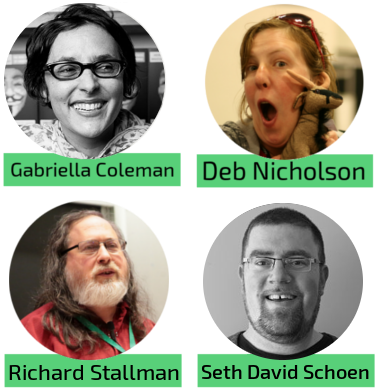This guest post is from GNU MediaGoblin founder Christopher Lemmer
Webber.
I'm happy to announce that after three years of standardization work
in the World Wide Web Consortium (W3C) Social Working Group,
ActivityPub has finally been made an official W3C recommended
standard. Hooray!
ActivityPub is a protocol for building decentralized social networking
applications. It provides both a server-to-server protocol (i.e.
federation) and a client-to-server protocol (for desktop and mobile
applications to connect to your server). You can use the
server-to-server protocol or the client-to-server protocol on their
own, but one nice feature is that the designs for both are very
similar. Chances are, if you've implemented support for one, you can
get support for the other with very little extra effort! We've worked
hard to make ActivityPub easy to understand. If this is your first
time reading about it, I recommend diving into the overview.
Why ActivityPub? Increasingly, much of our lives is mediated through
social networks, and so network freedom in these spaces -- and thus
removing central control over them -- is critical. One thing you may
have noticed in the last decade is that many decentralized free
software social networking applications have been written. Sadly, most
of those applications can't actually speak to each other -- a
fractured federation. I hope that with ActivityPub, we've improved
that situation. And indeed, you may already be using ActivityPub now
without realizing it. Mastodon, the incredibly popular free
software microblogging platform with over one million registered
users, uses ActivityPub to federate between servers, and many
more applications already either partially or fully support
ActivityPub. Seeing is believing, and in that vein I encourage you to
watch this video, which shows two totally different instances of
two totally different codebases (PeerTube and Mastodon)
federating. Pretty cool, right?
The standardization of ActivityPub has been a long journey. Three
years ago, MediaGoblin contributor Jessica Tallon and I agreed that we
wanted to make sure that whatever federation API we used was as
broadly compatible with other libre social networking sites as
possible, so when we heard about the Social Working Group, we applied
as invited experts. "We'll just show up to the hour-long meetings once
a week to make sure things are on track as far as our needs go," we
thought.
Well, next thing you know, we're both co-editors of
ActivityPub. ("Revolutions are run by those who show up," I suppose.)
ActivityPub took a lot of time and effort, and not just from Jessica
and I. ActivityPub's origins go back to StatusNet (the foundation for
what's now called GNU Social) and the experiences of its lead
developer, Evan Prodromou, in writing and developing the OStatus
protocol and its successor, the Pump API (on which ActivityPub is
based). Erin Shepherd converted the Pump API to the first drafts of a
standard with ActivityPub, and from there Jessica and I took over, with
major help from many community members and long conversations
with many different libre social networking platforms, not to mention
many hours of effort ActivityPub implementers. Thank you to everyone
who has participated!
One other noticeable effect of standardizing ActivityPub is that it
has taken up most of my time, so much so that I've been largely
absent from MediaGoblin, the project which was the initial motivator
for my participation in the standardization effort in the first
place. This even includes a long delay in merging our own federation
code, which was written by Jessica before and during the early days of
the standardization effort. Both ActivityPub and the world of Web
development in general changed a lot over the course of these
efforts.
Happily, the MediaGoblin community stepped up in my absence
(especially thanks to Boris Bobrov who stepped up as co-maintainer or,
let's be honest, maintainer over the last few years) and has kept
things running. But we're left in the odd position of being behind on
our federation efforts because of our work towards standardizing
federation. Was it worth it? Well, sometimes you know where you want
to go but not how to get there. Advancing federation was one of
MediaGoblin's big goals, and I'd say with the work that happened on
ActivityPub (which I'm convinced would have not made it all the way
without MediaGoblin motivating Jessica and I) and with the adoption
we're already seeing, I think so. Anyway, that's all to say that
MediaGoblin and ActivityPub have a journey forward together, though it
may be worth a bit of time to regroup on next steps. More on that to
come. And in the meanwhile, I think ActivityPub itself is a major
contribution to libre networks.
I do believe that building libre networks that are viable alternatives
to currently popular dystopian systems requires coordination, and
sometimes standardization bodies will be the place to do this, as I
believe was the case with ActivityPub. Notably, we began the process
with the W3C before the extremely unfortunate decision to effectively
endorse DRM through EME. I am glad we finished the work we
started and saw through the W3C process, and I have had the good
fortune to work with some incredible people through that organization
and surrounding communities. However I do believe the standardization
of EME was counter to the W3C's mission. What can we do to make sure
that the organizations which are meant to be stewards of network
freedom are able to stay true to these goals? I don't know, though I
think there is more to be examined in that space in the future.
Meanwhile, I am proud to see ActivityPub reach the W3C Recommendation
process. It's been a long road... but the most interesting journey is
ahead. And you can help, by building or contributing to an exciting
ActivityPub project of your own. And if you do? You should talk to us
about it!
Happy hacking on libre networks!
